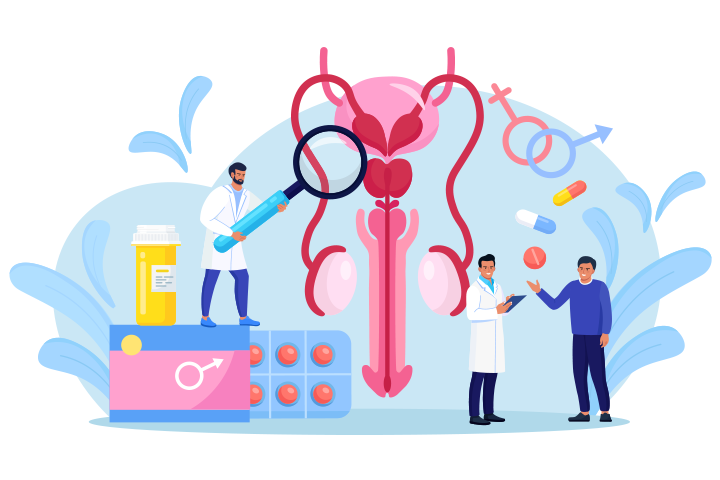It’s a problem nobody likes to talk about, but it affects millions of men worldwide. While having erection issues is occasionally normal, you may have erectile dysfunction (ED) if you commonly have difficulty achieving or maintaining an erection. It’s important to address consistent erection issues because it can lead to underlying health conditions.
Types of Erectile Dysfunction
There are two types of ED: organic erectile dysfunction and premature ejaculation. Organic ED is the most common form of ED and can usually be attributed to abnormalities of the arteries and veins in the penis. The most common causes of organic ED are:
- ardening of the arteries
- trauma to the arteries
- atrophy (tissue loss)
- fibrosis (excess growth of tissue)
Premature ejaculation occurs when you're unable to withhold ejaculation before or within one minute of penetration during all or most sexual encounters. The two types of premature ejaculation are:
- lifelong – experiencing premature ejaculation since your first sexual encounter
- acquired – developing premature ejaculation after having normal sexual encounters in the past, such as performance anxiety
What are the Risk Factors?
There are physical and psychological risk factors for ED such as:
- being over age 50
- type 2 diabetes
- obesity
- high blood pressure or cholesterol
- use of drugs, alcohol and tobacco
- chronic diseases like renal failure, vascular disease and heart disease
- hormonal imbalances such as low testosterone
- certain prescription medications
- mental health conditions like anxiety, depression and stress
- relationship issues
If you’re worried about ED, talk to your provider. In some cases, ED can be a result of an underlying condition that needs treatment.
Diagnosis and Treatments
Determining the cause of your ED helps your provider decide which treatment is best for you. During the diagnostic process, your provider may:
- ask questions about your medical history, sexual history, ED symptoms and mental health
- order blood and urine tests
Treatment for ED can be as simple as lifestyle changes to improve your heart and vascular health or addressing your mental health and emotional problems. Beyond lifestyle changes, your provider may recommend:
- prescription medications to help you get and keep an erection
- hormone replacement therapy to increase testosterone levels
- penile implant surgery
While it is advisable to consult a doctor regarding this issue, please note that TRS prescription plans do not cover medications for ED'

Coping with Erectile Dysfunction
ED doesn’t just affect you; it impacts your sexual partners as well. It’s natural to feel awkward or embarrassed when talking about ED with your partner, butit’s a very important conversation. Remember:
- You aren't alone. Millions of men experience ED.
- Communication is key in any relationship. Choose a time to talk with your partner outside of the bedroom and tell them how you're feeling about ED.
- Remind them you're still interested in a sexual relationship, and ED is a medical condition.
- Educate them about the different treatment options.
Intimacy doesn't require an erection. You can be intimate with your partner in many ways, both sexual and non-sexual. Have an open talk with them about what you're both comfortable with

Resources for TRS-ActiveCare and TRS-Care Standard
Provider Finder®
Use Provider Finder® to search for an in-network doctor who can help.
- TRS-ActiveCare Provider Finder log in
TRS-Care Standard Provider Finder log in
Mental Health Care
If your ED is caused by mental health issues, or is causing you to feel depressed, stressed or anxious, support is available.
Resources for TRS-Care Medicare
Find a Provider
Use the Provider Finder tool to search for an in-network doctor, hospital or other health care provider in your area. Remember, your plan covers one physical exam and one wellness visit per calendar year. You can ask your provider to combine the visits into one convenient annual care appointment.
Virtual Doctor Visit
See a doctor anytime using live video chat from your computer, tablet or smartphone. With Virtual Doctor Visits, you can ask questions, get a diagnosis or even get medication prescribed and sent to your pharmacy. All you need is a strong internet connection. Consider setting up an account with a Virtual Doctor Visit provider so you're ready when it's time to make an appointment.
Ways to access Virtual Doctor Visits: 1. On your computer, visituhcvirtualvisits.com and click on Choose a Medical Provider 2. On your tablet or smartphone:
· Download the American Well (Amwell) app
· Download the Doctor on Demand app
Download the Teladoc app or call 1-855-615-8335 to set up an account and request a visit by phone.
Optum Behavioral Health Optum Behavioral Health has over 87,000 network providers offering inpatient and outpatient services, such as therapy, behavioral health assessment and medication management. To start, call the behavioral health number on your member ID card or visit TRS-Care Medicare Advantagea Provider."  Mental Health Virtual Visits Support is available for ED-related mental health issues, such as depression, anxiety and stress. Connect with a mental health expert on your computer, tablet or smartphone. Visit VirtualVisitsMentalHealth.uhc.com to select a health care provider. They can evaluate and treat conditions such as depression and anxiety, and address substance use concerns.